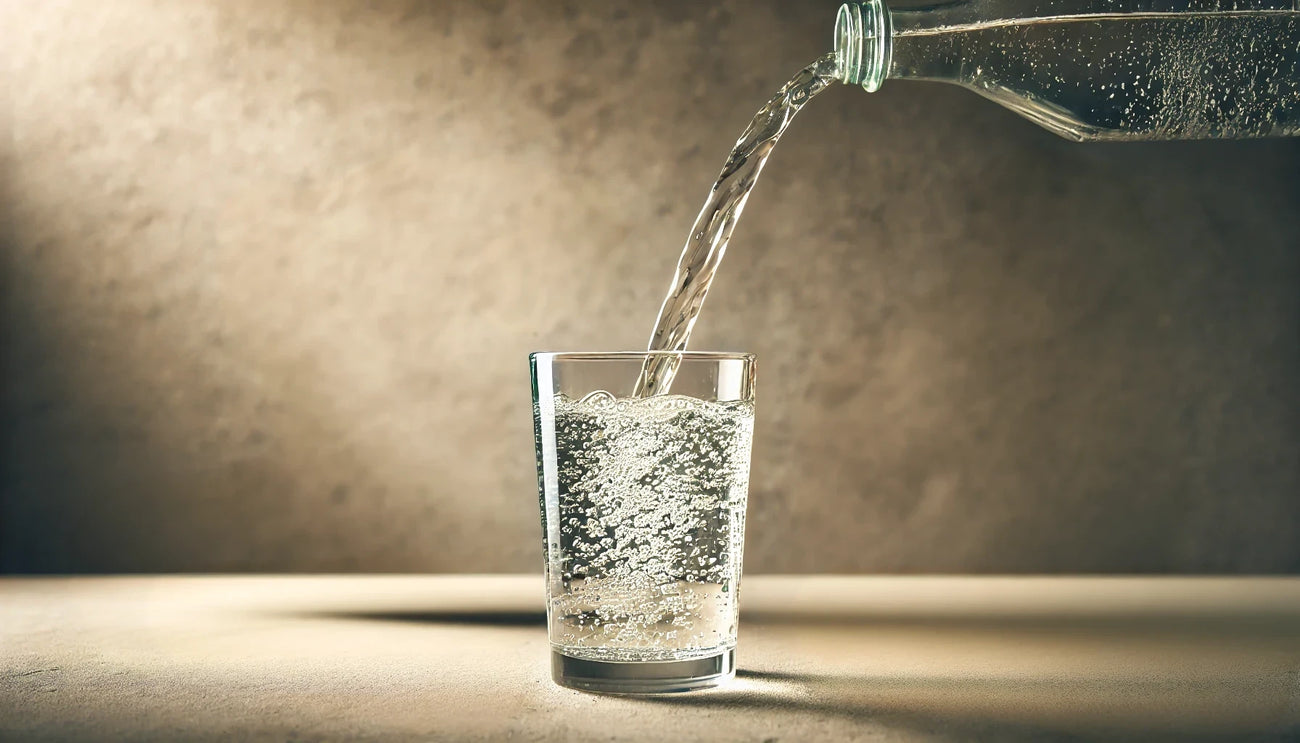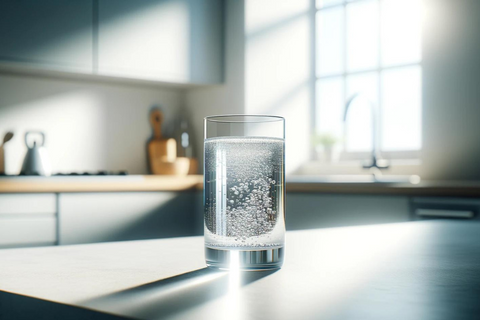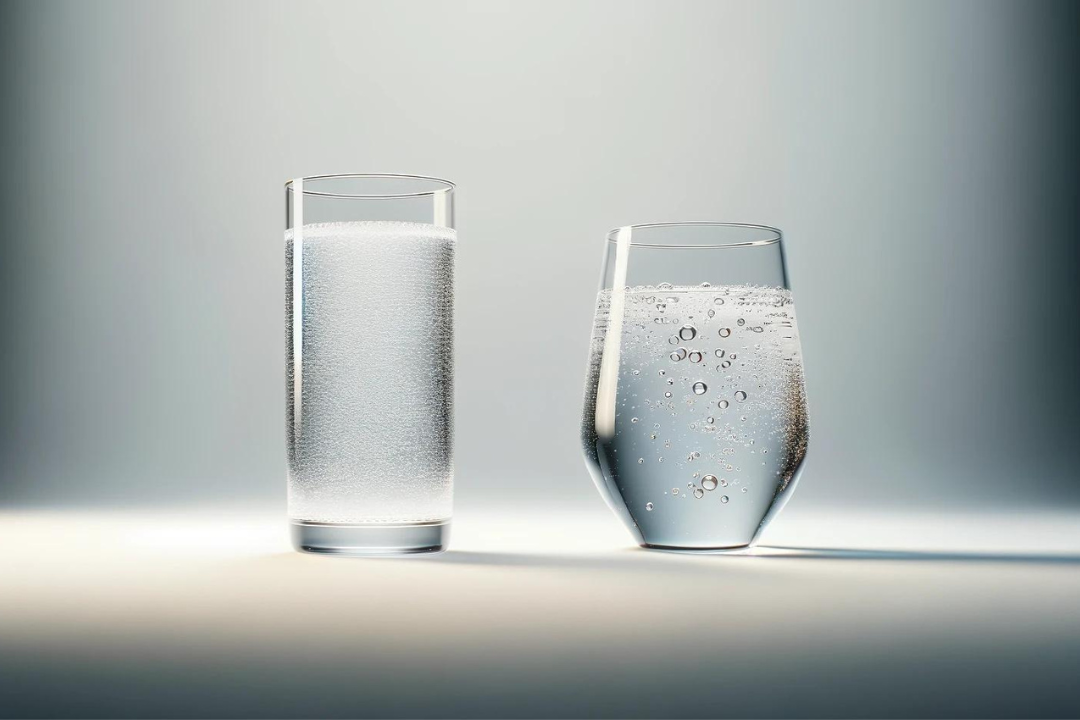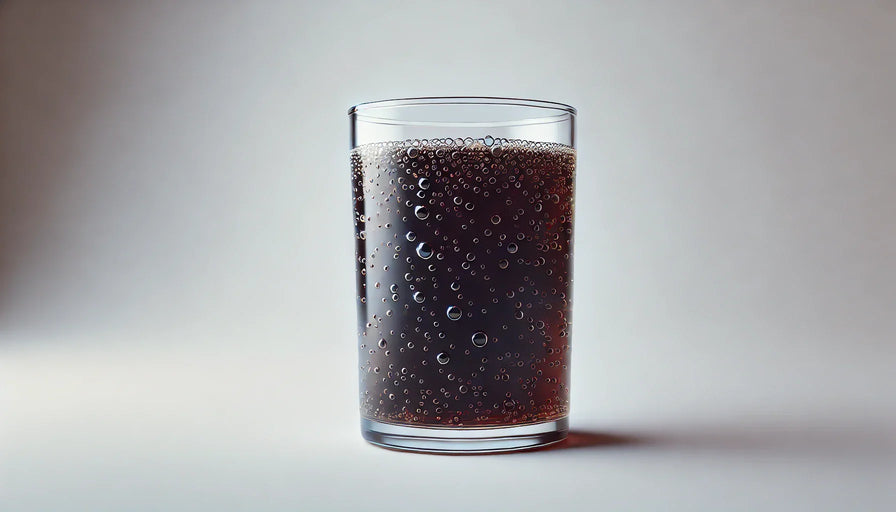
What is Carbonated Water?

What is carbonated water?
At its essence, carbonated water is merely filtered water infused with carbon dioxide gas under pressure. It is often savored on its own or used as a mixer in various beverages.
Carbonated water has surged in popularity as a refreshing beverage choice. Its distinctive bubbles and crisp taste provide a unique alternative to still water, spring water, and sugary sodas.
This blog will delve into the origins, production methods, and potential health benefits of carbonated water.
Table of contents
How is water carbonated?
Water is carbonated by infusing it with carbon dioxide (CO2) gas under pressure, which creates tiny bubbles that give it a distinctive effervescence.
This carbonation can be achieved through various methods, including the use of carbonation machines or industrial processes that mix CO2 with water in sealed containers.
When the pressure is released, the carbon dioxide forms bubbles, resulting in the sparkling quality of the water.
Learn how you can make sparkling water at home!

Is carbonated water bad for your kidneys?
There is no substantial evidence to suggest that carbonated water is harmful to your kidneys when consumed in moderation.
In fact, carbonated water can be part of a healthy diet and is a great form of hydration.
Some myths suggest that carbonated water might negatively impact kidney function or contribute to kidney stone formation as carbonated water is compared alongside popular soda brands.
However, the bubbles are the only thing these beverages have in common. Studies have found that soda can contribute to kidney stone formation due to the presence of phosphoric acid, but scientific studies have not corroborated similar effects with consuming carbonated water as it does not contain phosphoric acid.
The same can be true regarding ovarian health. There have been no scientific facts that carbonation can harden ovaries and cause damage. You can read more one this matter by navigating to our in depth article: Does Carbonation Harden Your Ovaries?
If you have pre-existing kidney conditions or other health concerns, it's advisable to consult with a healthcare professional for personalized advice.
Read more on the effects of carbonated water on kidneys.

Sparkling water vs carbonated water
Sparkling water and carbonated water are essentially the same thing—both refer to filtered water infused with carbon dioxide gas under pressure.
The primary difference isn't in the creation process but often in the marketing terms used. Both types are made by dissolving CO2 in water under pressure typically using a soda maker at home.
This is not to be confused with aerated water where the water is infused with air in general and not specific to under carbonation under pressure.
Beyond just plain carbonated water, the local stores offer a variety of carbonated beverages tailored to different tastes and uses.
We've written an in-depth article about the differences between carbonated waters available at the store from soda water to tonic water to club soda and everything in between.
Related read: Tonic Water vs Club Soda: What's the Difference?

Origins of carbonated water
The history of carbonated water dates back to the 18th century, when natural mineral springs were believed to possess healing properties. People flocked to these springs to drink or bathe in the water, hoping to cure various ailments.
The commercial production of carbonated water began in 1767 when English scientist Joseph Priestley discovered a method to artificially infuse water with carbon dioxide. This breakthrough led to the first artificially carbonated water and marked the dawn of its commercial availability.
Even though originated from natural springs, there is a difference between mineral water vs sparkling water.
Carbonated water is an umbrella of all kinds of bubbly beverages. Most common carbonated waters available at the store are soda water, club soda, tonic water, seltzer water, mineral water, and sparkling water.
Carbonated water side effects
While carbonated water is generally safe and enjoyed by many, it may cause some potential side effects, though these are not common.
Some individuals might experience bloating or gas due to the carbon dioxide in the water, which can lead to a feeling of fullness or discomfort.
Additionally, those with gastrointestinal conditions like acid reflux or irritable bowel syndrome (IBS) might find that carbonated water exacerbates their symptoms.
Despite these potential side effects, it's important to highlight that the vast majority of people can enjoy carbonated water without any issues, and these reactions tend to be relatively rare.
As everyone is different in body composition, many potential health benefits have been linked to drinking sparkling water as well such as an improvement in satiety, better digestion, and a great tool for those intermittent fasting.
Related read: Difference Between Soda Water and Seltzer Water

Carbonated water pH level
Carbonated water typically has a pH level of around 4, making it slightly acidic. This acidity results from carbon dioxide (CO2) dissolving in the water to form carbonic acid (H2CO3).
While carbonated water's pH is lower than plain water's neutral pH of around 7, it is still significantly less acidic compared to beverages like soda or fruit juices.
Related read: Is drinking sparkling water bad for your teeth?
What is carbonated water good for?
Beyond hydration and refreshing taste, carbonated water serves unconventional purposes:
- Cooking: Creates light, fluffy batters for tempuras and pancakes
- Art: Adds unique textures to paintings when mixed with watercolors
- Education: Fun element in science experiments for children
- Gardening: Great for watering plants at room temperature
Carbonated water's versatility extends into creative, culinary, and practical applications, beyond just health benefits.
Thinking of making a cocktail and need some bubbles? Learn the difference between tonic water and mineral water before you buy your ingredients!

Key takeaways
- Carbonated water is filtered water infused with carbon dioxide gas under pressure.
- Sparkling water and carbonated water are essentially the same.
- Carbonated water is safe for kidneys and part of a healthy diet when consumed in moderation.
- Potential minor issues when consuming carbonated water such as bloating or exacerbating gastrointestinal conditions.
- Carbonated water is slightly acidic with a pH of around 4, less acidic than many other beverages.
- It can be used for an array of activities such as supporting hydration, cooking, art, education, and gardening.
Recommended reading

How to Give Back During Thanksgiving 2025
Key takeaways Thanksgiving is a time to express gratitude and share with those in need. From volunteering at local shelters to donating food and essentials, there are numerous ways to give back to...

What Does Carbonation Do to Your Body?
What does carbonation do to your body? Carbonation alone typically has minimal effects; however, it can cause bloating and discomfort for some, and it may worsen acid reflux due to carbon dioxide ...

What Are the Health Benefits of Sparkling Water?
Summary Sparkling water isn't just a refreshing drink—it comes with surprising health benefits too. From aiding digestion to improving hydration, discover how sparkling water can be a healthy addi...